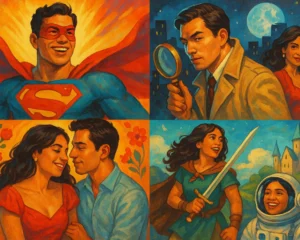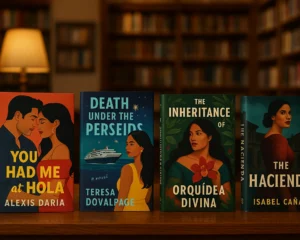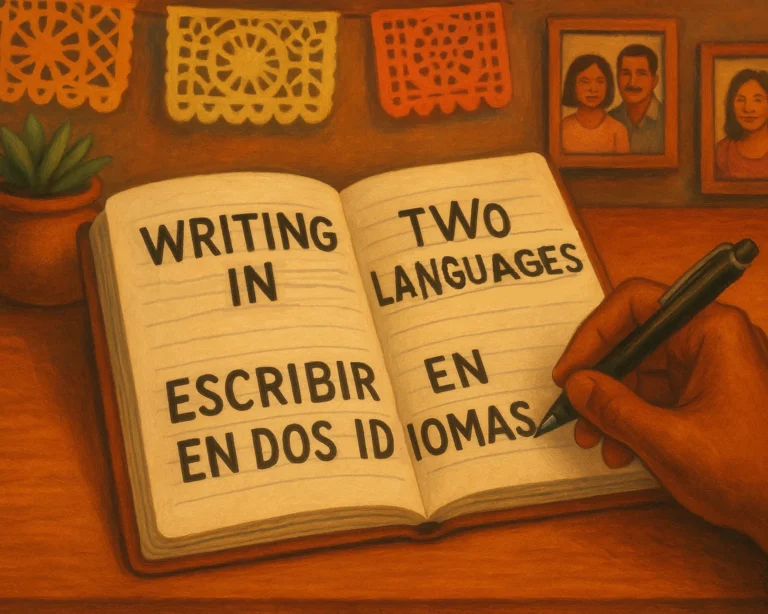For too long, Latinx literature has been confined to a narrow narrative — the immigration story, the struggle story, the tale of hardship and displacement. While these stories are important and valid, they represent only a fraction of the Latinx experience. As book influencer Carmen Alvarez recently noted, “I feel like we are getting away from the immigration story, the struggle story.” This shift represents a powerful expansion of what Latinx literature can be, who Latinx characters can become, and which stories Latinx writers are empowered to tell.
The 2025 landscape of Latinx literature is exploding with diversity — military science fiction, Lovecraftian cyberpunk, swashbuckling space adventures, contemporary romance, cozy mysteries, and gothic horror. Latino protagonists are solving crimes, falling in love, exploring distant galaxies, battling supernatural forces, and living ordinary lives filled with extraordinary moments. This genre diversity isn’t a departure from authentic Latinx storytelling — it’s an expansion of it, a recognition that Latino people contain multitudes and our literature should reflect that complexity.
The Weight of Expected Narratives
Many Latinx writers feel an unspoken pressure to write “the immigration story” or focus exclusively on trauma, struggle, and cultural displacement. This expectation comes from multiple sources — publishers seeking “authentic” Latino stories that fit predetermined molds, readers who associate Latinx literature with specific themes, and even well-meaning educators and critics who celebrate Latino voices primarily when they’re discussing hardship.
This pressure can be creatively stifling. It suggests that Latino experiences are only valid, only “authentic,” when they involve suffering or cultural conflict. It implies that a Latinx writer who wants to write a space opera or a rom-com is somehow abandoning their heritage or not being “Latino enough.” It reduces the rich diversity of Latino lives to a single narrative arc.
The truth is that Latino people live full, complex lives that encompass every human experience — joy, adventure, romance, mystery, wonder, humor, and yes, sometimes struggle. Our literature should reflect this full spectrum. As explored in our article on the role of culture in Latinx storytelling, cultural authenticity isn’t about conforming to expected narratives — it’s about bringing your whole self to whatever story you’re telling.
Latinx Authors Breaking Genre Boundaries
Contemporary Latinx authors are proving that you can write in any genre while maintaining cultural authenticity and creating distinctly Latino characters and narratives. These trailblazers are opening doors for the next generation of Latinx writers who want to explore beyond traditional literary fiction.
Silvia Moreno-Garcia: Gothic Horror and Historical Fiction
Mexican Canadian novelist Silvia Moreno-Garcia has become a New York Times bestselling author by writing gothic horror (“Mexican Gothic”), historical fiction (“The Daughter of Doctor Moreau”), and noir mysteries. Her work demonstrates that Latino characters and cultural elements can thrive in any genre. She doesn’t write immigration stories — she writes vampires in 1970s Mexico City, cursed mansions in the Mexican countryside, and reimagined classic literature through a Latino lens.
Moreno-Garcia’s success has been hard-won. She recalls an early publisher rejection where the editor praised the quality of her writing but said it wouldn’t sell because it was set in Mexico. That rejection reveals the industry bias Latinx genre writers face — the assumption that Latino stories only sell when they fit expected narratives. Her subsequent success proves that assumption wrong.
The Rise of Latinx Romance
Romance is one of the bestselling genres in publishing, and Latinx romance authors are claiming their space in this lucrative market. These aren’t stories about immigration or struggle — they’re stories about falling in love, finding happiness, and experiencing joy. Latino protagonists get to be desirable, romantic, successful, and happy without their entire identity revolving around cultural trauma.
Latinx romance authors are writing contemporary rom-coms, historical romances, paranormal love stories, and everything in between. Their characters are doctors, artists, small business owners, athletes, and everyday people whose Latino heritage is part of who they are but not the central conflict of their story. This represents a radical act of joy and self-affirmation.
Science Fiction and Fantasy Worlds
Latinx science fiction and fantasy authors are building entire worlds where Latino characters are heroes, leaders, and protagonists of epic adventures. From space operas to urban fantasy, from dystopian futures to magical realms, Latino characters are exploring possibilities beyond the constraints of realism and contemporary social issues.
These stories often incorporate Latino cultural elements — mythology, folklore, family dynamics, language — but in service of adventure, wonder, and imagination rather than cultural education or struggle narratives. A Latino protagonist can save the galaxy, wield magic, or solve a murder mystery while still being authentically Latino. According to Publishers Weekly, Latinx speculative fiction is one of the fastest-growing segments in publishing.
Writing Genre Fiction as a Latinx Author
If you’re a Latinx writer drawn to genre fiction — whether romance, mystery, science fiction, fantasy, horror, or any other genre — you don’t need permission to write those stories. Your Latino heritage doesn’t obligate you to write about immigration or struggle. You can write whatever calls to you while still bringing your cultural perspective and authentic voice to the work.
Incorporating Culture Without Making It the Conflict
One of the keys to successful Latinx genre fiction is incorporating cultural elements as enrichment rather than conflict. Your Latino detective can love his abuela’s cooking and speak Spanish with his family without the story being about cultural identity crisis. Your Latina space captain can have a quinceañera flashback without the plot revolving around immigration. Culture becomes texture, depth, and authenticity rather than the central problem to be solved.
This approach allows you to create Latino characters who feel real and culturally grounded while still participating fully in genre conventions. Your romance can have all the tropes readers love — enemies to lovers, fake dating, second chance romance — with Latino protagonists who bring their cultural perspective to those familiar scenarios. Your fantasy world can include Latino-inspired magic systems, naming conventions, and cultural practices without being a metaphor for real-world Latino struggles.
Avoiding Tokenism While Embracing Representation
Some writers worry that writing genre fiction with Latino characters might feel like tokenism — just swapping in a Latino name without meaningful representation. The antidote to tokenism is specificity and authenticity. Your characters should feel like real Latino people, not just white characters with Spanish names.
This means considering how their cultural background shapes their worldview, relationships, communication style, and values — even in a fantasy world or futuristic setting. It means including small authentic details that ring true to Latino readers. It means avoiding stereotypes while embracing cultural specificity. As discussed in our guide on finding your voice as a Latinx writer, authenticity comes from writing what you know and bringing your lived experience to your characters.
The Market for Diverse Latinx Stories
One concern some Latinx writers have about writing genre fiction is marketability — will publishers and readers embrace Latino characters in genres traditionally dominated by white protagonists? The answer is increasingly yes, though challenges remain.
Publishers are actively seeking diverse voices in genre fiction, recognizing that readers want to see themselves reflected in the stories they love. Romance publishers in particular have made concerted efforts to publish more Latinx authors. Science fiction and fantasy publishers are also expanding their offerings, though progress has been slower in some genres than others.
Readers are hungry for diverse genre fiction. Book influencers on BookTok and Bookstagram actively promote Latinx genre authors, helping them find audiences. Latino readers want to see themselves as the heroes, love interests, and protagonists of genre stories. Non-Latino readers are also embracing these books, discovering that great storytelling transcends cultural boundaries.
The success of authors like Silvia Moreno-Garcia, Zoraida Córdova, Anna-Marie McLemore, and many others proves that there’s a robust market for Latinx genre fiction. These authors aren’t succeeding despite writing genre fiction — they’re succeeding because they’re writing compelling stories with authentic Latino characters that readers can’t find anywhere else.
Permission to Write Your Story
If you’re a Latinx writer who’s been holding back from writing the genre story you’re passionate about because you worry it’s not “Latino enough” or doesn’t address “important issues,” consider this your permission slip. You don’t owe anyone a particular kind of story. You don’t have to write about immigration, discrimination, or cultural struggle unless that’s the story you want to tell.
Your Latino heritage will naturally infuse whatever you write — in the rhythms of your dialogue, the dynamics of your characters’ relationships, the cultural touchstones you reference, and the perspective you bring to universal human experiences. You don’t have to force it or make it the central conflict. It can simply be part of who your characters are, enriching the story without defining it.
The literary world needs Latino space explorers, detectives, romance heroes, fantasy warriors, and every other kind of character you can imagine. We need stories where Latino characters get to be happy, successful, adventurous, and fulfilled. We need stories that show the full range of Latino experiences, not just the struggles. We need your unique voice telling the stories only you can tell, in whatever genre calls to you.
Every time a Latinx author publishes a genre novel with Latino protagonists, they expand the possibilities for future Latinx writers. They show young Latino readers that they can be the heroes of any kind of story. They prove to publishers and readers that Latinx literature isn’t a monolith — it’s as diverse, complex, and multifaceted as the Latino community itself.
Embracing the Full Spectrum of Latinx Storytelling
The expansion of Latinx literature beyond immigration stories doesn’t diminish the importance of those narratives. Immigration stories, struggle stories, and stories about cultural identity remain vital and necessary. They reflect real experiences and provide representation for people living those realities. The goal isn’t to replace these stories — it’s to expand the range of what Latinx literature can encompass.
Imagine a literary landscape where Latinx writers feel free to write in any genre, explore any theme, and create any kind of character. Where a young Latino reader can find books about space adventures, magical quests, romantic comedies, and thrilling mysteries — all featuring protagonists who look like them and share their cultural heritage. Where Latinx authors aren’t pigeonholed into a single type of story but celebrated for the full range of their creative vision.
That landscape is emerging now, thanks to trailblazing Latinx authors who refuse to be confined by expected narratives. As you continue your writing journey, remember that you’re part of this expansion. Your genre fiction, your joyful stories, your adventures and romances and mysteries — they all contribute to a richer, more diverse Latinx literary tradition.
Write the story that excites you. Create the characters you want to spend time with. Explore the genres that spark your imagination. Bring your authentic Latino voice to whatever you write, and trust that your cultural perspective will enrich your storytelling in ways both subtle and profound. The world is ready for your story, whatever genre it inhabits. All you have to do is write it.





